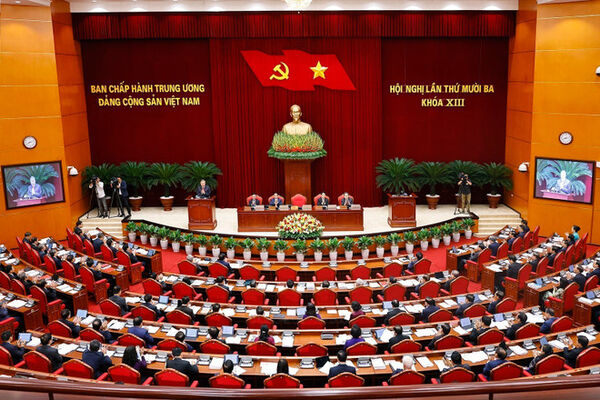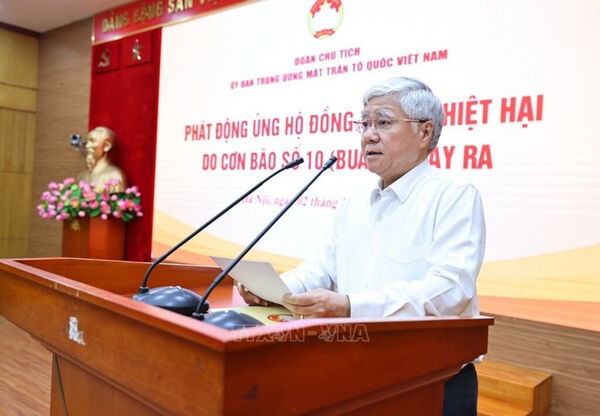 |
| The smart urban management centre in Dak Lak province (Photo: VNA) |
Hanoi (VNA) - Vietnam is making swift headway on targets set in the Politburo's Resolution 57, a landmark policy on sci-tech, innovation and national digital transformation. The resolution serves as a core strategy, identifying these domains as the pillars propelling Vietnam's ascent in the digital age.
In parallel with Resolution 57, the launch of the National Digital Transformation Programme and the drafting of a Digital Transformation Law, due for submission to the National Assembly at its next session, represent key advances in forging a comprehensive legal framework to drive the country’s digital transformation.
Strong policy momentum since 2020
To convert the Party's mandates into actionable steps, the Government and Prime Minister have rolled out a slate of strategic decisions since 2020. Standouts include the PM’s Decision 749, which endorses the National Digital Transformation Programme to 2025 with a vision to 2030, built on three pillars: digital government, digital economy and digital society. Additional measures encompass Decision 942 on advancing e-government toward digital government, and Decision 411 on the National Strategy for Digital Economy and Digital Society Development.
Resolution 57, in particular, lifts sci-tech and digital transformation to the status of national strategic pillars. The Government responded with Resolution 03 on January 9, 2025, and Resolution 71 on April 1, 2025, which detail specific action plans.
By the late September, among the 679 tasks under Resolution 71, 277 were done, including 186 on schedule and 91 delayed; 24 dragging their feet overdue and 378 on track. Under Plan No. 02-KH/BCDTW, 45 out of 70 tasks were completed, with two overdue and 23 progressing on schedule.
These figures reflect Vietnam’s firm political resolve and coordinated efforts across ministries and localities to drive digital transformation. The on-time finish of 186 tasks in 2025 signals concrete on-the-ground advances.
Tackling institutional bottlenecks
Even with these gains, digital transformation grapples with steep hurdles, notably outdated legal and policy regimes that trail real-world needs, fragmented digital infrastructure and data systems, and limited connectivity. The IT workforce, particularly at the grassroots levels, stays short-staffed and under-skilled.
Many firms, especially small and medium-sized enterprises, grapple with the expense and tech hurdles of going digital. Cybersecurity, data protection and upholding citizens' rights in digital spaces remain pressing concerns. Without a strong and unified legal framework, the push could stall, undermining its potential as a catalyst for socio-economic growth.
Against this backdrop, the Ministry of Science and Technology (MoST) is spearheading the Digital Transformation Law to dismantle regulatory roadblocks and hasten momentum.
Tran Quoc Tuan, head of investment management at the MoST’s National Authority for Digital Transformation, said the draft designates digital infrastructure, including public and industrial digital assets, as strategic national holdings. The state will favour budget outlays and harness private capital to build and upgrade digital infrastructure in a unified, secure, sustainable and green manner, focusing on high-impact socio-economic ventures.
The draft also lays out incentives to establish the digital economy as a prime growth engine, aiding SMEs, household businesses and cooperatives in their digital pivots. Notably, digital transformation outlays qualify as corporate income tax deductions. It fosters innovation, homegrown digital platforms, and healthy competition, and protects the legitimate rights and interests of consumers and workers in digital realms.
These clauses seek to slash costs across business scales, especially on infrastructure, freeing firms to innovate and tackle practical issues, Tuan revealed.
On the tech side, the draft frames digital technology advancement as a vital accelerator, stressing R&D and command of core digital tools. It prioritises sourcing "Make in Vietnam" digital goods and services for state-backed projects, to bolster local tech players and spark innovation via local solutions.
On cybersecurity, Tuan said the draft mandates adherence to existing information security and cyber rules. It spells out duties for digital platforms to curb toxic content, protect data and safeguard national digital sovereignty.
The draft carves out a full chapter for digital society, zeroing in on the protection of citizens' rights and interests online. It embraces a "people-first" stance, securing digital entitlements and broad access to essentials like digital IDs, signatures and e-transaction accounts. Targeted support goes to at-risk cohorts, such as kids, disabled individuals and ethnic minorities, with safeguards for children's online rights and boosts for a humane, civilised digital culture.
These steps target "digital trust," letting citizens and companies dive into digital spaces with assurance, while enabling equitable access to the benefits of digital transformation.
Ahead, fulfilling Resolution 57's mandates, plus enacting and enforcing the Digital Transformation Law, will lay a sturdy legal base so all Vietnamese can tap and thrive in the digital age equitably, securely and sustainably. This cements a vital stride toward Vietnam's goals of fast, enduring growth and tighter global integration in the digital age./.










